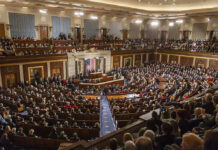
A high-profile Democrat’s rejection of party shutdown tactics exposes deep divisions and raises urgent questions about partisan priorities in Washington.
Story Snapshot
- Senator John Fetterman publicly broke with Democrats, calling for an end to the government shutdown and prioritizing American families over political leverage.
- Fetterman’s stance aligns more closely with Republicans, challenging party unity during a pivotal budget standoff.
- The shutdown, triggered by debate over Obamacare subsidies, threatens benefits for millions and escalates economic hardship.
- Fetterman’s move signals growing frustration with partisan gamesmanship as negotiations stall and services remain halted.
Fetterman Rejects Party Line, Urges Immediate Action
Senator John Fetterman (D-PA) made headlines by publicly diverging from Democratic leadership in the ongoing government shutdown, asserting that “country over party” should guide decision-making. His remarks come at a time when millions face the loss of vital services. Fetterman condemned the strategy of using working families as bargaining chips, stating that negotiations over issues like Obamacare subsidies should occur only after the government is reopened. This rare break from party ranks amplifies mounting frustration over political gridlock and echoes a sentiment long held by conservatives who believe government should serve the people, not partisan interests.
Fetterman’s position is notable for its alignment with Republican priorities, specifically the push to separate critical government funding from contentious policy debates. While Democratic leaders insisted on bundling ACA subsidies with broader funding, Republicans argued for reopening the government first, then addressing policy disputes. By publicly urging action to restore federal services, Fetterman highlights the real-world consequences of prolonged shutdowns—particularly for SNAP recipients and working families—whose livelihoods hang in the balance. His stance directly challenges the prevailing use of essential services as negotiating leverage, a tactic that has drawn criticism from both sides of the aisle.
Shutdown Intensifies Economic and Social Strain
As the government shutdown drags into late October, federal services remain halted and benefits for vulnerable populations are at risk. The current impasse centers around Obamacare subsidies, with Democrats refusing to pass a funding bill without their inclusion. The result is widespread disruption, including delayed paychecks for federal employees, suspension of SNAP benefits for millions, and uncertainty in local economies dependent on government spending. Previous shutdowns, such as those in 2013 and 2018-2019, had similar roots in divisive policy disputes. However, few have seen such a public break in party unity, underscoring the severity of the present crisis.
This shutdown further magnifies economic and political tensions nationwide. With federal contractors and healthcare providers also affected, the ripple effects touch every corner of the country. Low-income families face increased hardship, and the broader economy suffers from delayed government payments and reduced consumer confidence. For many Americans, such political brinkmanship reinforces a perception of government overreach and fiscal mismanagement—issues that have fueled conservative calls for limited government and accountability.
Implications for Party Dynamics and Voter Sentiment
Fetterman’s decision to oppose Democratic leadership has set a precedent, encouraging bipartisan criticism of shutdown tactics and potentially shifting party dynamics. Political analysts view his move as both courageous and pragmatic, prioritizing the needs of constituents over party loyalty. This episode may embolden other moderates and swing-state lawmakers to challenge partisan strategies that put ordinary Americans at risk. In the short term, the disruption of federal services is expected to continue as negotiations remain stalled. Long-term effects could include greater scrutiny of shutdown politics, increased calls for transparency, and renewed demands for leaders to put the country first.
John Fetterman ditches Dems in shutdown vote, urges to put America first
Source: New York Post https://t.co/KyQcejkeQq— Dave Nicholson (@DaveNic99453730) October 26, 2025
For conservative Americans, Fetterman’s break from party ranks highlights the dangers of prioritizing ideological agendas over practical solutions. The erosion of unity within the Democratic Party reflects broader dissatisfaction with polarization and government dysfunction. As federal workers, SNAP recipients, and families struggle with uncertainty, the need for principled leadership and common-sense governance becomes ever more pressing. This moment serves as a reminder that protecting American values and constitutional rights should always take precedence over political gamesmanship.
Sources:
John Fetterman Breaks with Democrats Over Shutdown, Urges to Put America First
Dems pressed on why using working families as leverage amid shutdown












